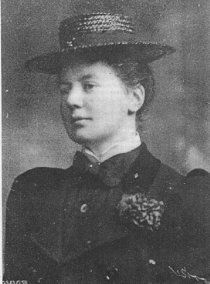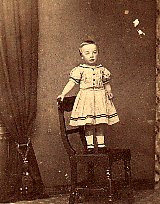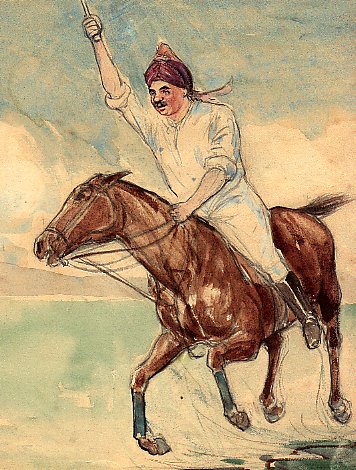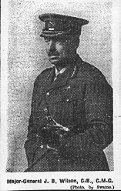 Blanche Brice Wilson (1894)
Blanche Brice Wilson (1894)J BARNETT WILSON |
Dear Miss Falkner,
My wife tells me that you are very much interested in Genealogies and all that and would
like some information about the Wilson pedigree.
Well I have tried to give you a sketch plan which I enclose herewith. It is correct so far as
it goes. I do not know whether you will be able to read it. I think the only way for me to
explain it is to give you a short note of the various families who make it up.
WILSON We have (the Wilson bunch) no pedigree to speak of. We are ordinary middle-
class people. My Grandfather William Wilson was established in business in the town of
BALLYMENA as a woollen draper in 1830. My father succeeded him in the business, but it has
passed out of the family some time ago now. I cannot trace the Wilsons further than that except
that old WILLIAM WILSON claimed descent from one of three brothers who came from Scotland in a
Scottish Regiment with WILLIAM of ORANGE. I feel certain this is correct or he would not have
claimed it. But we cannot prove it, having only the Crest (a Wolf's Head) on some old silver
and some book plates. It is a Border family probably originally WOLFFSON and come down from
DANISH (Viking) occupation of that part of the country. Like other border names, eg. Elliott,
Armstrong, Maxwell, etc., it is very common in Ulster.
KILLEN My father's mother was one of them. They were a well-known family in Co. Antrim.
One of them had GLENVILLE, a property in GLENWHERRY. My Grandmother came from that. The place,
however, is now in the occupation of a farmer and the property, which contained 13 or 14 small
farms, is broken up. The Killens were mostly parsons or doctors or in business. They had two
ancestors in the female line, both well-known in Ulster in bygone days. One was EDWARD BRYCE
(My Sister Blanche Bryce Wilson (now dead) was called after a lady of that family) I enclose
an account of E.B. given me by my cousin. Two points about him which is not mentioned in the
account is that his real name was BRUCE (of ERITH or ERRIS), a cadet of the Scots Royal House.
I don't know what he did, but he was banished from Scotland and changed his name to Bryce. He
has the Royal Arms of Scotland on his grave in Ballycarry. The other Killen ancestor was W.
GILLILAND, a Scottish Covenanter who had to fly from Scotland at the Covenant times as a Rebel
Presbyterian and came over to look for refuge in the Glens of Glenwherry. The people were very
good to him. He lived in a camp or cave on the hillside where he tethered his famous grey mare
and his dog kept home while he was fishing on the river in the valley.
One night, coming home, he was aware of a red light in the camp and saw, by the steel caps of
the English Dragoons, that his retreat had been found. He lay low till they were gone, taking
the outlaw's mare. He found they had killed his dog for defending his property.................
................ I think that tore it for Gilliland. He had nothing but what he stood in, and
an old-fashioned fishing rod with a spear at the butt. He broke off the top, sharpened the
spear, and set off on foot 18 or 20 miles to Carrickfergus Castle. History says he waited
three days. On the third day a watering party came out. The leading file of the troop had the
outlaw's mare. The story is that Gilliland speared his man from the ground and killed him.
The sprang on the grey mare and turned to the troop saying: "Now you dogs! Ride for it!" The
English did very well and followed him for 30 miles nearly to Skerry, close to here. But, of
course, they could never catch Gilliland's thoroughbred.
The Government gave him a grant of land and a "free pardon" after the trial whether because his
faction ( the Presbyterians) had by that time become paramount in Scotland and had compelled
the Government to make Protestantism the Established State Church of Scotland (and still remains)
or whether they did it on account of the way he handled that squadron, I do not know. Any way
they did and the Killens were among his descendants in The Glenwherry some of whom remain to
this day.
[NOTE BY RJBW: According to James Kenny's book "As The Crow Flies Over Rough Terrain" (And few
literary terrains could be rougher than this book!) Edward Bryce was born in Airth in 1569 and
educated in Edinburgh 1589-93, earning an MA. He was ordained by the Church of Scotland in 1595
and admitted to the Parish of Drymen, Stirlingshire in 1602. he left in 1607, being opposed to
the election of a particular moderator. In 1613 he was forced to flee the country, having been
deposed by the Archbishop and Presbytery of Glasgow over a false charge of adultery. He was
invited to Ireland and admitted to the Parish of what is now Ballycarry, (now the oldest
Presbyterian congregation in Ireland) and appointed Prebendry of Kilroot in 1619. In 1636 he
was deposed by the Bishop of Down for refusing to subscribe to the Canons but died before that
deposition could be effected.]
ORR W(illiam) Orr of Newgrove married my Grandmother's Sister. They had no family but
my Father, William Orr Wilson, was the godson and namesake and favourite nephew. At the death
of the old people he inherited Newgrove and I was born there. The place was sold when he
purchased the place Knowehead where we are now (about 60 years ago) (ED.NOTE 1867). Newgrove
is now occupied by a farmer. W(illiam). Orr of Newgrove belonged to the same family as another
W(illiam). Orr (Remember Orr) who was hanged as a political rebel in 1798. Orr of Newgrove was
also banished to Van Diemen's Land as they then called it. A Free Pardon was sent after him.
Apparently the English Government of those days was always pardoning people for things they
didn't do. (see Gilliland) (However Orr did not wait for trial but escaped and came home from
India with a fortune years later.) They could not exactly pardon 'Remember Orr' but they gave
his son a commission in an infantry regiment and I believe he was a major at Waterloo. There
were a lot of Orrs and Hugomonts. One was a judge. the other, Col. Alexander Stuart Orr,
commanded the 18th. Royal Irish at one time.
That is the Orr History as far as I know it and accounts for the Orr Crest on some of Jack's
Silver.
[NOTE BY RJBW See THE ORR PAPERS for a rather fuller account of
William Orr.]
BARNETT My mother's name. Her father was a shipowner and distiller of Carrickfergus
and Belfast. His father and grandfather had some property, Ballyaughty, in Co. Down. We have
portraits (oil paintings) of my great-great-grandfather John ( the 2nd.) of ??place with his
wife who wears a turban. I don't know what date that kit was in vogue in this county. About
Waterloo times I imagine. There were an enormous number of sisters of my Grandfather, James
Barnett but they don't come into his store.
James Barnett married Elizabeth Wallace of Co.
Down. The Wallaces are a well-known family in that county. The last one, Col. Robert Wallace
C.B. was a leading Orangeman and supporter of Carson's in the troubles some time before the
war. His only son was drowned I think in a speedboat the other day. they lived at a place
called Myra Castle in Strangford but I think they are now extinct.
 Blanche Brice Wilson (1894)
Blanche Brice Wilson (1894) |
Letter from Barnett to his sister, Blanche Brice Dickson, written in 1914Barnett writes of the trials and tribulations of being the SMO at a major military hospital during the early days of WW1. The 'Winston' he mentions was, of course, Winston Churchill, then First Lord of the Admiralty, later to gain some notoriety in WWII. |
||
Lieut.-Colonel Barnett Wilson, R.A.M.C.9 Senior Medical Officer at
Shorncliffe, to Mrs David Dickson.
1 Wellington Terrace,
Sandgate.
23 Dec. 1914
I am afraid I have neglected you but as a matter of fact I have neglected everything
of late as there has been such a lot of work knocking about that I have had no time
for private correspondence.
My hospital besides being the place where the 12th
Division, 20,000 men, is looked after, is the centre for about 40 hospitals all over the
country run by various red cross people mostly ladies. I have had no more wounded
coming direct to Folkestone lately but they come by rail from Southampton and we
distribute them as soon as they are fit to move to various Hospitals and Convalescent
Homes.
All the payments of these people have got to be arranged for with the Paymaster.
He will only issue the money when certain rules in making their lists are complied with.
In spite of the most rigidly foolproof orders they won't comply, but prefer sending it in
on scalloped notepaper with a scent of musk or some other strange game of their own.
He will only receive a list of names with dates of admission and discharge. I of
course get cursed by both and my table groans with letters. My clerks are all
going sick. Every creature from Cornwall to John O' Groats land writes me.
One man, a solicitor, writes to say his son has gone to France to drive a red
cross motor for the R.A.M.C. and he has sent him a Thermos flask and some
sandwiches, and they have never been heard of and it is disgraceful and will I
find them at once and return them. I reply, please consult the police or the
coroner or the Post Office or the Mayor of Folkestone or the Prefect of Calais
or any one in the whole world except me. Another gent asks my leave to fly a
red cross flag over a hospital he is on the Committee of in the Isle of Thanet.
I reply does he consider-- himself justified in the rash act as he must be aware
the Germans can't resist firing on it when they see it.
Some lady wants me to arrange a special steamer to bring her son who
she hears is wounded direct to Folkestone and thence to L. Somebody
or other as she hears the other way is longer. While considering how to
tell her that she really means the letter for Winston from whom I have
not as yet taken over the Navy, the telephone bell in my office explodes,
and a frantic gentleman in some corner of Kent says, the Belgian soldier
I last sent him has got drunk and come home late for tea and is giving
trouble will I send an armed escort for him, Just as the telegraph boy brings in
the 172nd telegram for the day saying another Belgian at Bumbleton-on-the Mill
has expired and will I make full choral arrangements for the funeral and bring
over the Bishop of Louvain. Before I can reply to any of them the G.O.C. sends
for me and says the camp is up to your knees in mud and do I think we can billet
5,000 men in Folkestone.
The next game is some auctioneer's clerk says
he is a free Englishman - He is and there ain't going to be nobody billeted on him
not if he knows it and he has to be shown my watch and asked if he will hand over
the house in 5 minutes or take a permanent seat in the local lockup in ten the matter
being indifferent to me but solely a matter between him and his conscience but the
Sergt and 2 constables are waiting in the street, 10 wires from Southampton being
pushed into my hand while I wait, and my orderly being told off to hold the telegraph
boy while I write the 9 necessary wires in reply on the top of the dresser in the scullery,
and push them into the boy's hand and him out into the street.
One night after a day of this kind as I was crawling home after some 14 hours of
this a boy scout pushed a paper into my hand with large scarlet letters on it
Will YOU Help and melted in the darkness before I could say a word.
We11 Dear B. I must conclude. Best Salaams and kindest wishes to you and
David and all. I am doing all I know to get out to the front as soon as possible
not so much to take a hand in the war as to try and get a slight lucid interval of
peace.
I have of course as yet no experience of this war. But my trifling experiences of two
former ones have taught me that, in war time, if you want to be left alone a bit,
the nearer you get to the firing line the better chance you have.

The death took place yesterday at his residence, Knowehead, Broughshane,
Ballymena, of Major-General James Barnett Wilson. He was 74 years of age.
Major-General Wilson distinguished himself both in his educational and military
career. After attending the Royal Belfast Academical Institution and
Queen's College, Belfast, he graduated with an M.D. at Edinburgh-University in
1883.
 Shortly afterwards he joined the Royal Army Medical Corps and saw service
on the North-West frontier of India, serving with the Malakand Field Force
which attacked and captured Tangi Pass, and he was awarded a medal with
clasp for his services there. He also saw service in the Northern Transvaal
during the South African War, for which he received a medal with five clasps, and
in Egypt 1904-1909.
Shortly afterwards he joined the Royal Army Medical Corps and saw service
on the North-West frontier of India, serving with the Malakand Field Force
which attacked and captured Tangi Pass, and he was awarded a medal with
clasp for his services there. He also saw service in the Northern Transvaal
during the South African War, for which he received a medal with five clasps, and
in Egypt 1904-1909.
 Major-General Wilson was senior medical officer with the forces in Jamaica from
1912 to 1914, and for subsequent services in France he received the C.M.G.
and the C.B. (During the Great War he was mentioned three times in despatches.)
He was also awarded the French Croix de Guerre and the Belgian Ordre de la Couronne.
His promotion to Major-General came in May, 1918, and he retired from the Army in 1921.
Major-General Wilson was senior medical officer with the forces in Jamaica from
1912 to 1914, and for subsequent services in France he received the C.M.G.
and the C.B. (During the Great War he was mentioned three times in despatches.)
He was also awarded the French Croix de Guerre and the Belgian Ordre de la Couronne.
His promotion to Major-General came in May, 1918, and he retired from the Army in 1921.
A keen sportsman and a crack shot, Major-General Wilson was a member of the North
of Ireland Gun-Dog Society, lending his lands for the annual trials. He
was president of the Mid-Antrim Anglers' Association. He was also Chairman of
the Broughshane Branch of the British Legion and a member of First Broughshane
Presbyterian Church.
He is survived by his wife. and two sons, Captain J. B. Wilson, of the Royal Engineers,
and Captain D. A. O. Wilson, of the Royal Army Medical Corps.
The funeral takes place on Saturday to Kirkinriola Cemetery.
Return to the Wilson Family Tree or to the Genealogy Central page.
NALIL
North Antrim Local
Interest List